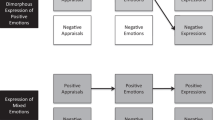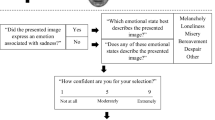Abstract
Knowledge of emotion enables recognition of one’s specific emotional states, such as sadness. Although different sadness subtypes evoke different automatic psychophysiological responses, it is unclear whether they are internalized as different concepts. Two experiments were conducted to examine the properties of sadness concepts. We hypothesized that sadness subtypes are internalized as different concepts based on distinguishing features related to crying manner, which construct knowledge of emotion. Study 1 used crying-related onomatopoeias and emotional contexts in a contextual congruency test. The 70 participants rated the congruity of 32 onomatopoeias for loss and failure contexts. The onomatopoeias were divided into high-, middle-, and low-fitting groups based on word-pair correlations. In the middle-fitting group, more highly congruent words for each context were mixed. Based on these findings, we additionally hypothesized one of the distinguishing features for each sadness was related to behavioral activation properties of crying. Study 2 asked 22 participants to perform a verbal acceptability judgment test. As predicted, these properties distinguished between the two types of sadness. Loss-sadness was associated with static features, while failure-sadness was linked to dynamic and voice properties. These findings indicate loss- and failure-sadness are internalized as distinct concepts based on the differences at least in behavioral activation features.


Similar content being viewed by others
References
Allen, N. B., de, L., Horne, D. J., & Trinder, J. (1996). Sociotropy, autonomy, and dysphoric emotional responses to specific classes of stress: A psychophysiological evaluation. Journal of Abnormal Psychology, 105, 25–33. https://doi.org/10.1037//0021-843X.
Andrews, P. W., & Thomson, J. A. (2009). The bright side of being blue: Depression as an adaptation for analyzing complex problems. Psychological Review, 116, 620–654. https://doi.org/10.1037/a0016242.
Barr, R. G., Hopkins, B., & Green, J. A. (2000). Crying as a sign, a symptom and a signal. Cambridge, UK: Cambridge University Press.
Barrett, L. F. (2006). Solving the emotion paradox: Categorization and the experience of emotion. Personality and Social Psychology Review, 10, 20–46. https://doi.org/10.1207/s15327957pspr1001_2.
Barrett, L. F. (2011). Constructing emotion. Psychological Topics, 20, 359–380.
Barrett, L. F. (2017). How emotions are made: The secret life of the brain. New York, NY: Houghton-Mifflin-Harcourt.
Barsalou, L. W., Simmons, W. K., Barbey, A. K., & Wilson, C. D. (2003). Grounding conceptual knowledge in modality-specific systems. Trends in Cognitive Sciences, 7, 84–91. https://doi.org/10.1016/S1364-6613(02)00029-3.
Bellieni, C. V. (2017). Meaning and importance of weeping. New Ideas in Psychology, 47, 72–76. https://doi.org/10.1016/j.newideapsych.2017.06.003.
Bianchin, M., & Angrilli, A. (2012). Gender differences in emotional responses: A psychophysiological study. Physiology & Behavior, 105, 925–932. https://doi.org/10.1016/j.physbeh.2011.10.031.
Booth, A. E., & Waxman, S. (2002). Object names and object functions serve as cues to categories for infants. Developmental Psychology, 38, 948–957. https://doi.org/10.1037/0012-1649.38.6.948.
Cunningham, M. R. (1988). What do you do when you’re happy or blue? Mood, expectancies, and behavioral interest. Motivation and Emotion, 12, 309–331. https://doi.org/10.1007/BF00992357.
Deng, W. S., & Sloutsky, V. M. (2015). The development of categorization: Effects of classification and inference training on category representation. Developmental Psychology, 51, 392–405. https://doi.org/10.1037/a0038749.
Duncan, S., & Barrett, L. F. (2007). Affect is a form of cognition: A neurobiological analysis. Cognition and Emotion, 21, 1184–1211. https://doi.org/10.1080/02699930701437931.
Ekman, P., Levenson, R. W., & Friesen, W. V. (1983). Autonomic nervous system activity distinguishes among emotions. Science, 221, 1208–1210. https://doi.org/10.1126/science.6612338.
Ellsworth, P. C., & Smith, C. A. (1988). From appraisal to emotion: Differences among unpleasant feelings. Motivation and Emotion, 12, 271–302. https://doi.org/10.1007/BF00993115.
Elman, J. L. (2004). An alternative view of the mental lexicon. Trends in Cognitive Sciences, 8, 301–306. https://doi.org/10.1016/j.tics.2004.05.003.
Finlay, B. (2015). It hurts to be human: Why pain is fundamentally different for us. New Scientist, (May 6).
Forgas, J. P. (1998). On feeling good and getting your way: Mood effects on negotiator cognition and bargaining strategies. Journal of Personality and Social Psychology, 74, 565–577. https://doi.org/10.1037/0022-3514.74.3.565.
Forgas, J. P. (2013). Don’t worry, be sad! On the cognitive, motivational, and interpersonal benefits of negative mood. Current Directions in Psychological Science, 22, 225–232. https://doi.org/10.1177/0963721412474458.
Frijda, N. H. (1986). The emotions. New York, NY: Press Syndicate of the University of Cambridge.
Fussell, S. R. (2002). The verbal communication of emotion: Interdisciplinary perspectives: Introduction and overview. In S. R. Fussell (Ed.), The verbal communication of emotion: Interdisciplinary perspectives (pp. 1–22). Mahwah, NJ: Lawrence Erlbaum Associates.
Gross, J. J., Fredrickson, B. L., & Levenson, R. W. (1994). The psychophysiology of crying. Psychophysiology, 31, 460–468. https://doi.org/10.1111/j.1469-8986.1994.tb01049.x.
Holmes, T. H., & Rahe, R. H. (1967). The social readjustment rating scale. Journal of Psychosomatic Research, 11, 213–218. https://doi.org/10.1016/0022-3999(67)90010-4.
Hunt, W. A. (1941). Recent developments in the field of emotion. Psychological Bulletin, 38, 249–276. https://doi.org/10.1037/h0054615.
Imai, M., Kita, S., Nagumo, M., & Okada, H. (2008). Sound symbolism facilitates early verb learning. Cognition, 109, 54–65.
Inose, H. (2007). Translating Japanese onomatopoeia and mimetic words. Translation Research Projects, 1, 97–116.
Izard, C. E. (1991). The psychology of emotions. New York, NY: Plenum Press.
Kalat, J. W., & Shiota, M. N. (2007). Emotion (1st ed.). New York, NY: Wadworth.
Kutas, M., & Federmeier, K. D. (2000). Electrophysiology reveals semantic memory use in language comprehension. Trends in Cognitive Sciences, 4, 463–470. https://doi.org/10.1016/S1364-6613(00)01560-6.
Kutas, M., & Hillyard, S. A. (1980). Reading senseless sentences: Brain potentials reflect semantic incongruity. Science, 207, 203–205.
Kutas, M., & Hillyard, S. A. (1984). Brain potentials during reading reflect word expectancy and semantic association. Nature, 307, 161–163. https://doi.org/10.1038/307161a0.
Lalli, A. (2000). A feature-based analysis of Greek nominal inflection. Glossologica, 11, 201–227.
Lazarus, R. S. (1991). Emotion and adaptation. Oxford: Oxford University Press.
LeDoux, J., Phelps, L., & Alberini, C. (2016). What we talk about when we talk about emotions. Cell, 167, 1443–1445. https://doi.org/10.1016/j.cell.2016.11.029/.
Lench, H. C., Tibbett, T. P., & Bench, S. W. (2016). Exploring the toolkit of emotion: What do sadness and anger do for us? Social and Personality Psychology Compass, 10, 11–25. https://doi.org/10.1111/spc3.12229.
Levenson, R. W. (1999). The intrapersonal functions of emotion. Cognition and Emotion, 13, 481–504. https://doi.org/10.1080/026999399379159.
Lupyan, G., Rakison, D. H., & McClelland, J. L. (2007). Language is not just for talking: Redundant labels facilitate learning of novel categories. Psychological Science, 18, 1077–1083. https://doi.org/10.1111/j.1467-9280.2007.02028.x.
Malatesta, C. Z., & Wilson, A. (1988). Emotion cognition interaction in personality development: A discrete emotions, functionalist analysis. British Journal of Social Psychology, 27, 91–112. https://doi.org/10.1111/j.2044-8309.1988.tb00807.x.
Mendolia, M., & Kleck, R. E. (1993). Effects of talking about a stressful event on arousal: Does what we talk about make a difference? Journal of Personality and Social Psychology, 64, 283–292. https://doi.org/10.1037/0022-3514.64.2.283.
Moors, A. (2009). Theories of emotion causation: A review. Cognition and Emotion, 23, 625–662. https://doi.org/10.1080/02699930802645739.
Nelson, K. (1974). Concept, word, and sentence: Interrelations in acquisition and development. Psychological Review, 81, 267–285. https://doi.org/10.1037/h0036592.
Nesse, R. M. (1990). Evolutionary explanations of emotions. Human Nature, 1, 261–289. https://doi.org/10.1007/BF02733986.
Nesse, R. M., & Ellsworth, P. C. (2009). Evolution, emotions, and emotional disorders. American Psychologist, 64, 129–130. https://doi.org/10.1037/a0013503.
Ono, M. (2007). Giongo/Gitaigo 4500 nihongo onomatope jiten [Japanese onomatopoeia dictionary 4500 mimetics]. Tokyo: Shogakukan.
Ortner, C. N. M. (2015). Divergent effects of reappraisal and labeling internal affective feelings on subjective emotional experience. Motivation and Emotion, 39, 563–570. https://doi.org/10.1007/s11031-015-9473-2.
Ozturk, O., Krehm, M., & Vouloumanos, A. (2013). Sound symbolism in infancy: Evidence for sound–shape cross-modal correspondences in 4-month-olds. Journal of Experimental Child Psychology, 114, 173–186.
Pavlenko, A. (2008). Emotion and emotion-laden words in the bilingual lexicon. Bilingualism Language and Cognition, 11, 147–164. https://doi.org/10.1017/S1366728908003283.
Plutick, R. (1980). Emotion: A psychoevolutionary synthesis. New York, NY: Harper & Row.
Plutick, R. (2002). Emotions and life: Perspective from psychology, biology, and evolution. Washington, DC: American Psychological Association.
Rosch, E., Mervis, C. B., Gray, W., Johnson, D., & Boyes-Braem, P. (1976). Basic objects in natural categories. Cognitive Psychology, 8, 382–439. https://doi.org/10.1016/0010-0285(76)90013-X.
Sadoff, R. L. (1966). On the nature of crying and weeping. The Psychiatric Quarterly, 40, 490–503.
Sander, D., & Scherer, K. R. (2009). The Oxford companion to emotion and the affective sciences. Oxford: Oxford University Press.
Seidenfeld, A. M., Johnson, S. R., Cavadel, E. W., & Izard, C. E. (2014). Theory of mind predicts emotion knowledge development in head start children. Early Education and Development, 25, 933–948. https://doi.org/10.1080/10409289.2014.883587.
Shaver, P., Schwartz, J., Kirson, D., & O’Connor, C. (1987). Emotion knowledge: Further exploration of a prototype approach. Journal of Personality and Social Psychology, 52, 1061–1086. https://doi.org/10.1037/0022-3514.52.6.1061.
Shiota, M. N., & Kalat, J. W. (2011). Emotion (2nd ed.). New York, NY: Wadworth.
Shirai, M., & Suzuki, N. (2013). The classification and structures of situations eliciting sadness. Japanese Journal of Research on Emotions, 20, 105–112. https://doi.org/10.4092/jsre.20.105.
Shirai, M., & Suzuki, N. (2017). Is sadness only one emotion?: Psychological and physiological responses to sadness induced by two different situations: “Loss of someone” and “failure to achieve a goal”. Frontiers in Psychology, 8(288), 1–10. https://doi.org/10.3389/fpsyg.2017.00288.
Shirai, M., & Suzuki, N. (2018). Physiological changes in response to the feelings of sadness induced by two different situations. Japanese Society for Physiological Psychology and Psychophysiology, 34, 203-212. https://doi.org/10.5674/jjppp.1614br
Soshi, T., Fujimaki, N., Matsumoto, A., & Ihara, A. S. (2017). Memory-based specification of verbal features for classifying animals into super-ordinate and sub-ordinate categories. Frontiers in Communication, 2(12), 1–14. https://doi.org/10.3389/fcomm.2017.00012.
Spencer, H. (1855). Principals of psychology. London: Longman, Brown, Green & Longmans.
Tamori, I. (2002). Onomatope: Giongo/Gitaigo wo tanoshimu [Onomatopoeia: enjoy giongo/gitaigo]. Tokyo: Iwanami.
Torre, J. B., & Lieberman, M. D. (2018). Putting feelings into words: Affect labeling as implicit emotion regulation. Emotion Review, 10, 116–124. https://doi.org/10.1177/1754073917742706.
Vingerhoets, A. J. J. M. (2013). Why only humans weep: Unraveling the mysteries of tears. Oxford, UK: Oxford University Press.
Waxman, S. R., & Markow, D. B. (1995). Words as invitations to form categories: Evidence from 12-to 13-month-old infants. Cognitive Psychology, 29, 257–302. https://doi.org/10.1006/cogp.1995.1016.
Williams, G. C. (1966). Adaptation and natural selection. In Princeton. New Jersey: Princeton University Press.
Xu, F., Cote, M., & Baker, A. (2005). Labeling guides object individuation in 12-month-old infants. Psychological Science, 16, 372–377. https://doi.org/10.1111/j.0956-7976.2005.01543.x.
Acknowledgments
We gratefully acknowledge the work of past and present members of our laboratory and participants. We are grateful to the reviewers for their valuable comments. We would like to thank Editage (www.editage.jp) for English language editing. This work was financially supported by JSPS KAKENHI Grant Number JP18K13285.
Author information
Authors and Affiliations
Corresponding author
Ethics declarations
Conflict of Interest
All authors declare that they have no conflict of interest.
Appendices
Appendix 1
Appendix 2
Rights and permissions
About this article
Cite this article
Shirai, M., Soshi, T. & Suzuki, N. Knowledge of Sadness: Emotion-related behavioral words differently encode loss and failure sadness. Curr Psychol 40, 895–909 (2021). https://doi.org/10.1007/s12144-018-0010-9
Published:
Issue Date:
DOI: https://doi.org/10.1007/s12144-018-0010-9




